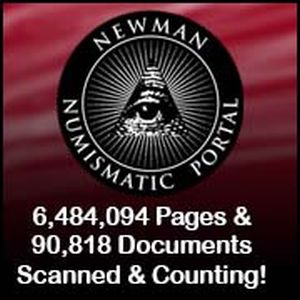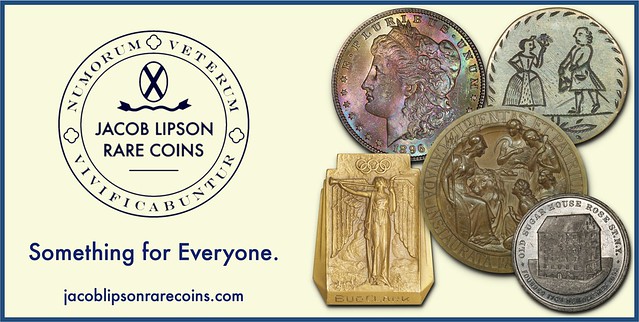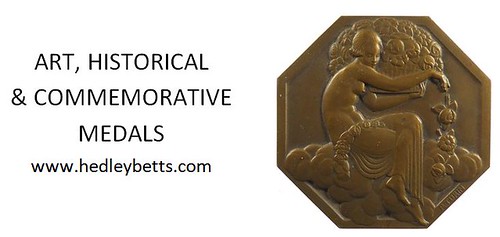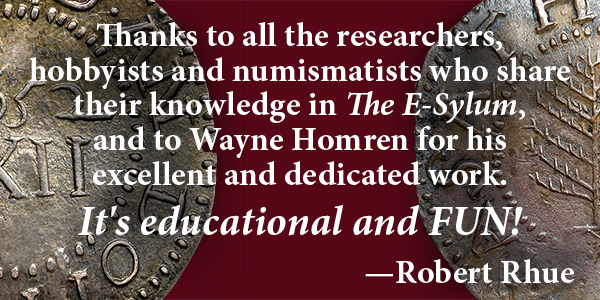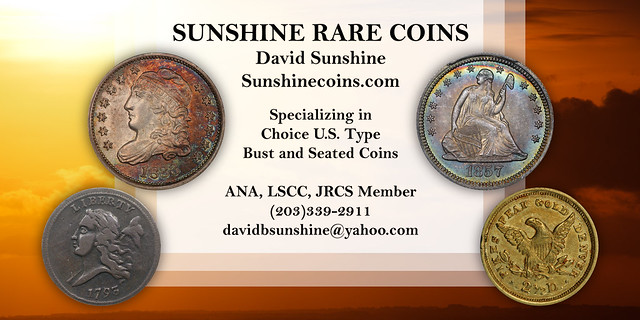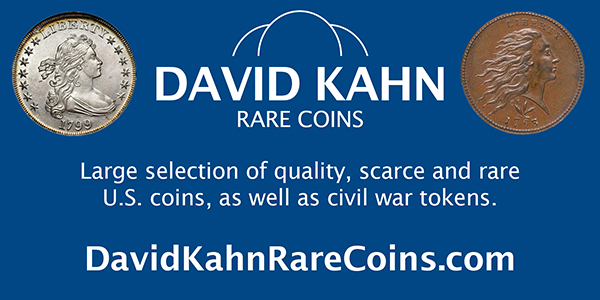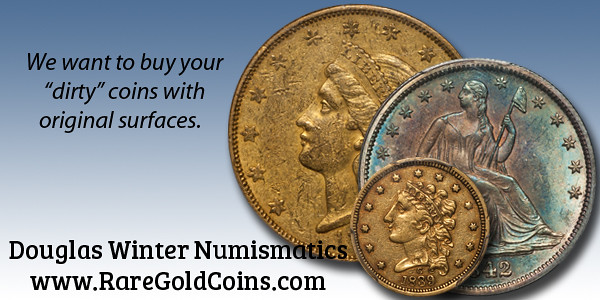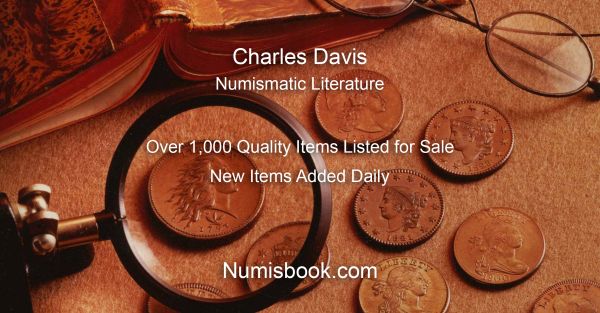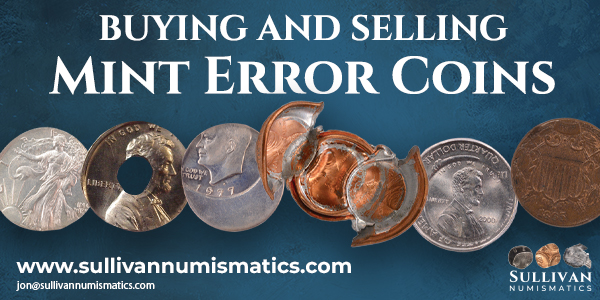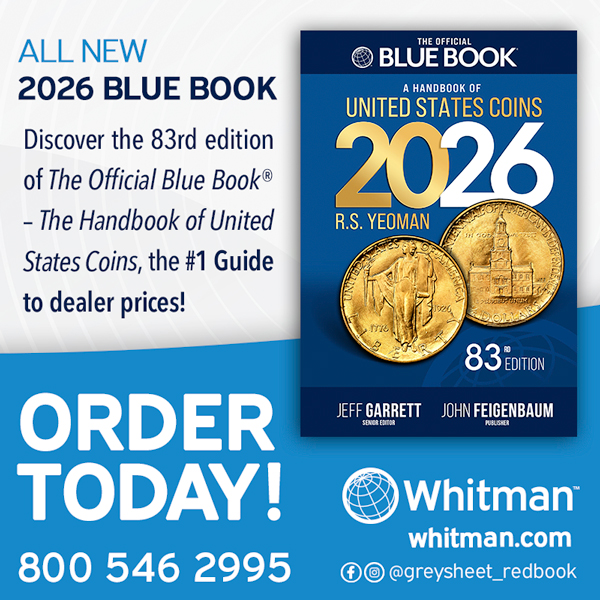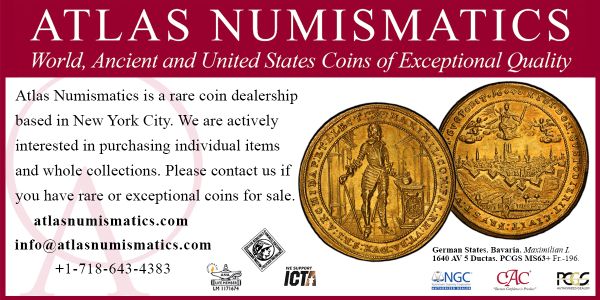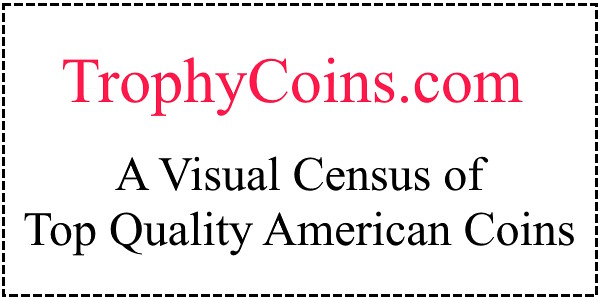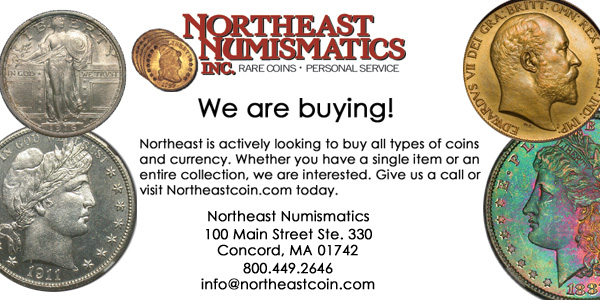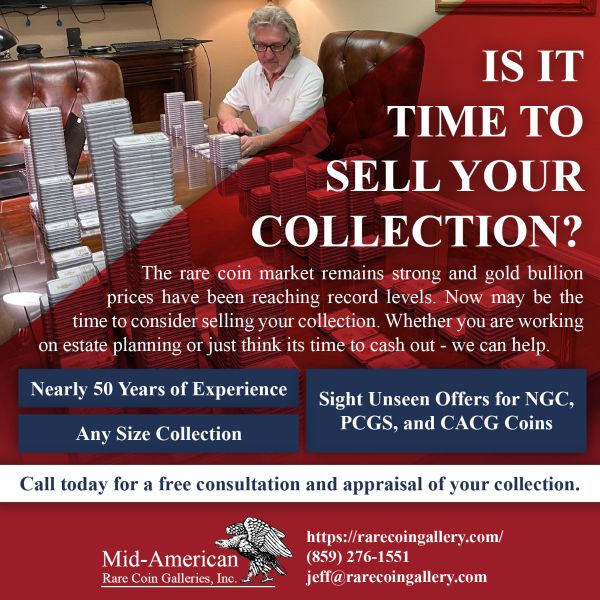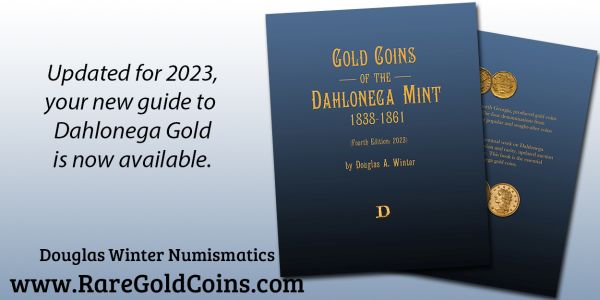
Visit our NBS Sponsors


About UsThe Numismatic Bibliomania Society is a non-profit association devoted to the study and enjoyment of numismatic literature. For more information please see our web site at coinbooks.org SubscriptionsThose wishing to become new E-Sylum subscribers (or wishing to Unsubscribe) can go to the following web page link MembershipThere is a membership application available on the web site Membership Application To join, print the application and return it with your check to the address printed on the application. Print/Digital membership is $40 to addresses in the U.S., and $60 elsewhere. A digital-only membership is available for $25. For those without web access, write to: Jeff Dickerson, Treasurer AsylumFor Asylum mailing address changes and other membership questions, contact Jeff at this email address: treasurer@coinbooks.org SubmissionsTo submit items for publication in The E-Sylum, write to the Editor at this address: whomren@gmail.com BUY THE BOOK BEFORE THE COINSale Calendar
|
- WAYNE'S WORDS: THE E-SYLUM MAY 11, 2025
- NBS 2025 CHARITY AUCTION DONATIONS SOUGHT
- KOLBE & FANNING MAY 2025 SALE ANNOUNCED
- NEW BOOK: THE FIRST MEXICAN CENT OF 1841
- NEW BOOK: MALTESE TOKENS
- NEW BOOK: MILLIONAIRES OF THE WESTERWALD
- PERIODICAL: MCA ADVISORY SPRING 2025
- PERIODICAL: PAPER MONEY, MAY-JUNE 2025
- NNP SCANS U.S. MINT MARKETING MATERIALS
- 2025 NNP SYMPOSIUM VIDEOS AVAILABLE
- VIDEO: GETTING KIDS INVOLVED IN COIN COLLECTING
- ANS AMERICA 250 MEDAL PROJECT DONATIONS SOUGHT
- MAY 2025 PAN SHOW EVENTS
- THE CROWNED F 'FOREIGNER'S MARK'
- NOTES FROM E-SYLUM READERS: MAY 11, 2025
- CASTORLAND SCAVENGER HUNT ANNOUNCED
- A 100 GREATEST U.S. COINS COLLECTION
- VOCABULARY TERM: RESTRIKE
- WILLIAM HESSLEIN (1868-1932)
- TREASURE TALK WITH BOB EVANS, EPISODE 4.2
- NUMISMAGRAM MEDAL SELECTIONS: MAY 11, 2025
- KUENKER TO SELL RONUS COLLECTION FOR ANS
- NOMOS TO SELL COLLIER COLLECTION FOR ANS
- VULCAN ON ANCIENT COINS
- SEDE VACANTE COINS
- HOBO NICKEL FLAPPER CARVINGS
- WAR MUSEUM EXTENDS VICTORIA CROSS EXHIBIT
- MOTHER'S DAY NUMISMATICS
- UNEXCHANGED SWISS BANKNOTE FUNDS
- LOOSE CHANGE: MAY 11, 2025
- ABOUT THIS ISSUE: MAY 11, 2025
Content presented in The E-Sylum is not necessarily researched or independently fact-checked, and views expressed do not necessarily represent those of the Numismatic Bibliomania Society.
WAYNE'S WORDS: THE E-SYLUM MAY 11, 2025
 Thank you for reading The E-Sylum. If you enjoy it, please send me the email addresses of friends you think may enjoy it as well and I'll send them a subscription. Contact me at whomren@gmail.com anytime regarding your subscription, or questions, comments or suggestions about our content.
Thank you for reading The E-Sylum. If you enjoy it, please send me the email addresses of friends you think may enjoy it as well and I'll send them a subscription. Contact me at whomren@gmail.com anytime regarding your subscription, or questions, comments or suggestions about our content.
This week we open with the annual NBS Charity Auction, a numismatic literature sale, three new books, two periodicals (and in lieu of a partridge in a pear tree), updates from the Newman Numismatic Portal, ANS, and more.
Other topics this week include Maltese tokens, U.S. Mint marketing materials, the NNP Symposium, the PAN Show, Foreigner's Marks, restrikes, William Hesslein, fixed price and auction selections, Vulcan on ancient coins, Sede Vacante coins, Mother's Day numismatics, and flappers on Hobo Nickels.
To learn more about an original subscription set of Sylvester Crosby's The Early Coins of America, the 1841 Mexican cent, the massive 1976 National Bicentennial Medal, the Great Kentucky Hoard, North American Indian Peace Medals, 1838-O Half Dollars, Castorland Jetons, the Ronus Collection, and the Book of Armaments, read on. Have a great week, everyone!
Wayne Homren
Editor, The E-Sylum
NBS 2025 CHARITY AUCTION DONATIONS SOUGHT
Each year at the ANA World's Fair of Money, the Numismatic Bibliomania Society conducts a charity auction to raise funds for the organization. NBS President Len Augsburger submitted this announcement of this year's auction. Thanks! -Editor
NBS Solicits Donations for Annual Charity Auction
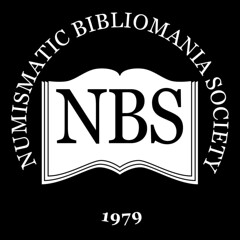 Once again, NBS will present a Charity Auction fundraiser at the Oklahoma City ANA convention. This will occur Friday, August 22, during the NBS general meeting. Anyone interested in donating material may contact David Fanning (df@numislit.com) or Len Augsburger (leonard.augsburger@wustl.edu) for further information.
Once again, NBS will present a Charity Auction fundraiser at the Oklahoma City ANA convention. This will occur Friday, August 22, during the NBS general meeting. Anyone interested in donating material may contact David Fanning (df@numislit.com) or Len Augsburger (leonard.augsburger@wustl.edu) for further information.
THE BOOK BAZARRE
KOLBE & FANNING MAY 2025 SALE ANNOUNCED
Kolbe & Fanning have announced their next numismatic literature sale, featuring books on ancient, world and U.S. numismatics. -Editor
 Kolbe & Fanning Numismatic Booksellers are pleased to announce that we will be holding our
next auction sale on Saturday, May 31, 2025. The sale includes rare and out-of-print works on
ancient, world and U.S. numismatics, including the second half of the L.D. & I.P. Library and
additional selections from the library of Barry Tayman. With 500 lots, there is something for
everybody.
Kolbe & Fanning Numismatic Booksellers are pleased to announce that we will be holding our
next auction sale on Saturday, May 31, 2025. The sale includes rare and out-of-print works on
ancient, world and U.S. numismatics, including the second half of the L.D. & I.P. Library and
additional selections from the library of Barry Tayman. With 500 lots, there is something for
everybody.
Some highlights of the sale include:
NEW BOOK: THE FIRST MEXICAN CENT OF 1841
Pablo Luna Herrera has published a new book on Mexican pattern coins and a unique coin, the 1841 cent. Congratulations! -Editor
I am writing to inform you of the publication of my latest book, which specializes in Mexican pattern coins.
The investigation focuses on a unique coin, the 1841 cent, which is highly symbolic due to its significance in the history of Mexican currency. It is the first manifestation of the decimal currency system in Mexico, more than twenty years before the successful introduction of centavo coins. The investigation reveals new information about this coin, much of which has never been previously disclosed.
NEW BOOK: MALTESE TOKENS
Yosef Sa'ar passed along this information about a new book on the tokens of Malta. Thank you! -Editor
Maltese Tokens a collection
Jeanette e Stivala née McLarty, Tony Stivala
 This publication is about tokens used in Malta during the British period, mainly from the late Victorian period to the 1960s. The Stivalas have managed to find a good number of tokens since Lyall's 1999 publication, in which 95 different establishments had been identified. This publication identifies no less than 84 new establishments, most of which are new or different to those already identified by Lyall.
This publication is about tokens used in Malta during the British period, mainly from the late Victorian period to the 1960s. The Stivalas have managed to find a good number of tokens since Lyall's 1999 publication, in which 95 different establishments had been identified. This publication identifies no less than 84 new establishments, most of which are new or different to those already identified by Lyall.
These Malta ‘tokens', in their various forms and intended use, tell the economic and social history of Malta, albeit, at times, verging on the shady side. Nevertheless, it is a Malta story which these tokens help to commemorate and immortalize. Tony and Jeanette Stivala deserve our compliments for publishing such a rare collection and research for everyone's enjoyment and perusal, a most welcome addition to Melitensia collections and publications.
NEW BOOK: MILLIONAIRES OF THE WESTERWALD
A new book by Uwe Bronnert is a monetary history of Germany's Westerwald region. Here's a Google-translated excerpt from an article from the Geldscheine Online newsletter. -Editor
 The Millionaires of the Westerwald
The Millionaires of the Westerwald
A regional monetary history
By Uwe Bronnert
What the author, known for his numerous specialist articles on national and international paper money history, has achieved for his home region is much more than "just" a catalog of emergency money. In his well-known meticulous style, he places the emergency money from the period of the First World War and the "Weimar Republic" in historical context and presents a true "textbook and reader" on German monetary history during the "emergency money period," which serves as a model for all other German regions.
After an introductory section on the "primal catastrophe" of the 20th century – the First World War and its consequences – the author turns to the emergency money of the districts of Altenkirchen, Ober- and Unterwesterwald, and Westerburg.
PERIODICAL: MCA ADVISORY SPRING 2025
The Spring 2025 issue of the MCA Advisory from the Medal Collectors of America has been published. -Editor
Napoleon's Latinists And Their Medals
by Tom Turk
The Davison Copenhagen Badge
by Sim Comfort
Comitia Americana: A Later Unadopted Die Trial
by Edward H. Hollister
Something Different: A Colorful & Irregular French Medical Medal
by Ira Rezak
New Admiral Vernon Die Marriage Surfaces in Recent Auction
by Doug McIndoe
PERIODICAL: PAPER MONEY, MAY-JUNE 2025
A new issue of Paper Money from the Society of Paper Money Collectors has been published. -Editor
- Blanton's 1s & 2s--Mark Coughlan
- $10 18-Subject Wrong Plate Serial Numbers--Peter Huntoon
- Panic of 1907--Matt Hansen, Lee Lofthus, Peter Huntoon
- Portraits on Parade--Tony Chibbaro
- Pin Money --Terry Bryan
- Great Seal of the U.S. on Guatemalan Bank Notes--Roland Rollins
- Astoria New York Post Office Robbed--Bob Laub
NNP SCANS U.S. MINT MARKETING MATERIALS
The latest addition to the Newman Numismatic Portal is a great collection of U.S. Mint marketing materials. Project Coordinator Len Augsburger provided the following report. -Editor
 U.S. Mint Marketing Material on Newman Portal
U.S. Mint Marketing Material on Newman Portal
At the recent Central States convention, Bruce Bartelt made available to Newman Portal a large collection of U.S. Mint marketing materials covering the period 1966-2023. There are hundreds of advertising pieces here, reflecting the prodigious production of U.S. Mint collector issues over the past couple generations. One of the more spectacular Mint emissions during this period is the 1976 National Bicentennial Medal in .900 fine gold, a massive, 3-inch diameter medal that weighs in at 15 ounces, representing 13.5 ounces of pure gold. By comparison, the Washington Before Boston medal in gold, held by the Boston Public Library, weighs "only" 8 ounces.
Market appearances of the National Bicentennial medal in gold include an example sold by Heritage on March February 27, 2025, for $44,400, while another piece at Heritage sold for $54,000 on April 30, reflecting the rising value of gold. This medal is cataloged as Swoger 52IAa, in his National Commemorative Medals of the United States of America (2008). Swoger notes a mintage of 424 pieces. The original issue price was $4,000, representing a significant premium over the 1976 melt value of about $1,685. By comparison, at today's (May 2) gold price of $3,249, the bullion value of the medal is $43,861, which is more consistent with recent auction results.
2025 NNP SYMPOSIUM VIDEOS AVAILABLE
Newman Numismatic Portal Project Coordinator Len Augsburger also provided the following report on the recent NNP Symposium. -Editor
Newman Portal Symposium 2025 Video Now Available
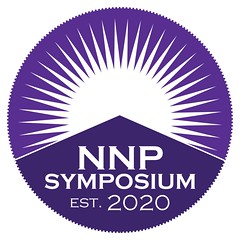 Featuring 18 presentations, the 2025 Newman Portal Symposium was held April 24-26 in conjunction with the Central State Numismatic Society convention in Schaumburg, IL. Video of this event is now available on the Newman Numismatic Portal YouTube channel. Speakers covered a variety of ancient, world, and modern numismatic topics.
Featuring 18 presentations, the 2025 Newman Portal Symposium was held April 24-26 in conjunction with the Central State Numismatic Society convention in Schaumburg, IL. Video of this event is now available on the Newman Numismatic Portal YouTube channel. Speakers covered a variety of ancient, world, and modern numismatic topics.
A highlight of this year's Symposium was Jeff Garrett's talk on the Great Kentucky Hoard, a recent find of 800 U.S. gold coins from the Civil War-era, unearthed on a Kentucky farm. The presentation included video of the coins in situ, prior to excavation. This a tribute to the finder, who understood the import of the event from the very moment of discovery. We would not have been so patient!
VIDEO: GETTING KIDS INVOLVED IN COIN COLLECTING
The David Lisot Video Library on the Newman Numismatic Portal can be found at:
https://nnp.wustl.edu/library/multimediadetail/522852
We highlight one of his videos each week in The E-Sylum. Here's one from 2009 with young collectors (who aren't so young anymore) talking about enticing new collectors. -Editor
ANS AMERICA 250 MEDAL PROJECT DONATIONS SOUGHT
The American Numismatic Society is organizing a project to select and commission a medal commemorating the U.S. Semiquincentennial. -Editor
Help the ANS commemorate the American Semiquincentennial with a Medal!
The ANS is gearing up to issue a medal to commemorate the American Semiquincentennial. The ANS is trying to raise funds via a GoFundMe at https://gofund.me/fddfd532 to help defray the fixed costs of getting the project off the ground. Any donation, large or small is welcome. The goal is to issue a beautiful, high quality, relatively low mintage, struck medal that is not prohibitively expensive. The only way to do that is to seek support from donations.
MAY 2025 PAN SHOW EVENTS
The Pennsylvania Association of Numismatists runs the largest national show in the northeast, getting bigger and better nearly every year. Now it's busting out to take over the entire Monroeville Convention Center just outside Pittsburgh. Pat McBride (also known as Dr. Benjamin Franklin) is PAN's President, and he shared these thoughts in his President's Message in the Spring 2025 issue of the club publication The Clarion. -Editor
 I am very excited about our expansion into the South Hall starting with the Spring
PAN Coin Show occurring May 29–31, 2025. Our plan is to greatly expand our Competitive Exhibits space. The exhibit committee wants to attract more participants from all
areas of the country. We are no longer confined by the number of cases or multiple exhibits anymore. This is a major growth opportunity for us.
I am very excited about our expansion into the South Hall starting with the Spring
PAN Coin Show occurring May 29–31, 2025. Our plan is to greatly expand our Competitive Exhibits space. The exhibit committee wants to attract more participants from all
areas of the country. We are no longer confined by the number of cases or multiple exhibits anymore. This is a major growth opportunity for us.
The expansion will provide more space for our previously overcrowded PANKidZone. Our Young Numismatist Committee is working on more interactive activities since there will now be plenty of space. Numismatic Imagination will now become a reality with the new space. I am anxious to see what new features are offered for our young and growing coin enthusiasts.
The South Hall will also feature a special display, "Artifacts and Coins of the S.S. Central America, Ship of Gold." Chief Scientist and Historian Bob Evans and display creator Greg Darnstaedt will be present to take you on this incredible shipwreck find!
THE CROWNED F 'FOREIGNER'S MARK'
Julia Casey submitted these notes on the "Crowned F" counterstamp. Thank you! -Editor
 Regarding the 'crowned F' counterstamps from the April 27th E-Sylum. A mark that seems possibly to be related to the stamp on the halfpenny was used on guns made in England. It is a "Foreigner's Mark" and Google A.I. gave me these details below. I hunted around and found a few images from 18th century gun auctions. I don't know if the stamp on the shilling could be part of this same category. Like you said, it does look a little different.
Regarding the 'crowned F' counterstamps from the April 27th E-Sylum. A mark that seems possibly to be related to the stamp on the halfpenny was used on guns made in England. It is a "Foreigner's Mark" and Google A.I. gave me these details below. I hunted around and found a few images from 18th century gun auctions. I don't know if the stamp on the shilling could be part of this same category. Like you said, it does look a little different.
NOTES FROM E-SYLUM READERS: MAY 11, 2025
More on 1733 Rosa Americana Twopence Copies
 Saul Teichman writes:
Saul Teichman writes:
"I saw the article on the 1733 Rosa Americana twopence copies. With regard to the original, it is noted that five are known but I can only trace four: British Museum, Garrett, Boyd-Ford and Norweb-Ford. The Smithsonian, which is often mentioned as having one, does not. It has several copies."
Thank you! -Editor
To read the earlier E-Sylum article, see:
ROSA AMERICANA 1733 TWOPENCE IMAGES AND COPIES
(https://www.coinbooks.org/v28/esylum_v28n18a09.html)
Other topics this week include 1838-O Half Dollars, and the Norco Vodka Encased Half Dime. -Editor
CASTORLAND SCAVENGER HUNT ANNOUNCED
Chester Sullivan is a longtime researcher of the Castorland Jetons, a fascinating episode in early American history. To encourage collectors to report examples new to his census he's offering a monetary award. -Editor
Castorland was long assumed to have been a small colony of French refugees but in fact Castorland was a 2,000 acre land speculation directed by the well-connected French banker, Pierre Chassanis. To add glamour to his enterprise Chassanis arranged for jetons to be minted and their relevance to American history made them sought by collectors. The coins were struck in small batches from 1796 into the mid-eighteen hundreds. To build a firm basis for their study I assembled descriptions of specimens into a Census of Original-Dies Castorland Jetons with the first specimen in the list identified as AA, the next one AB, etc. The Census ID's proceed alphabetically and the most recently added specimen is DO. So the Census now has 93 fully described specimens.
To stimulate interest in searching out even more specimens I'm inviting researchers to accompany me on a scavenger hunt. Researchers who describe new specimens for the Census will be honored (and enriched) by the handsome Jefferson Monetary Award for Excellence in Numismatic Research certificate. An easy to follow guide, How to Identify Original-Dies Castorland Jetons, can be viewed on the NNP. It includes a listing by Type of all specimens currently in the Census. And the money reward is real, but winners have to find it.
A 100 GREATEST U.S. COINS COLLECTION
Numismatic books have always led the way for the numismatic hobby. The publication of a new catalog often ignites interest in a sleepy or overlooked series. The coins were always there, but the book now provides a guide for collectors.
A Greysheet article from Great Collections Coin and Currency Auctions describes the slow reveal of a collection based on the 100 Greatest U.S. Coins book by Jeff Garrett. These coins have always been sought by collectors, but the book provides a new way of organizing a collection. -Editor
Over the past few weeks, coin collectors have been enjoying one of the greatest reveals in numismatics, with a user on numismatic social media platform MyCollect posting daily updates of the rare coin collection he has assembled over the past five years.
This is not just any collection or set - it is based on the 100 Greatest U.S. Coins book by Jeff Garrett. While the collector has not posted the number of coins in his collection yet, MyCollect members are already speculating whether it will surpass that of famed past collectors such as Louis Eliasberg and Amon Carter, and even current collector D.L. Hansen, who has an impressive 69 coins from the 100 coins listed in the publication.
VOCABULARY TERM: RESTRIKE
Here's another entry from Dick Johnson's Encyclopedia of Coin and Medal Terminology. -Editor
Restrike. A numismatic item struck from original dies but at a later time than the original issue – coins struck in a year later than the date they bear, medals struck after an interval of time and regular issuing has ceased. Restrikes are often by dies in deteriorated state, usually (but not always) the restriking is unauthorized and mostly surreptitious.
A restrike denotes the use of at least one original die; if a replacement or copy die is used (of the exact same designs but not made from the original hub or model) it is termed a novedel. The term restrike is not to be confused with reissue (which implies a proper authorization for use of the old dies) nor with revision (which implies the use of new copy dies or reworked old dies).
WILLIAM HESSLEIN (1868-1932)
E-Sylum Feature Writer and American Numismatic Biographies author Pete Smith submitted this article on dealer William Hesslein. Thank you! -Editor
 A profile of William Hesslein was in The E-Sylum five years ago on May 3, 2020. This article
will expand somewhat on what was mentioned then. Public records for William Hesslein have
gaps and inconsistencies. My emphasis is on his residence and his family more than on his
numismatic business. This is my best guess on the facts.
A profile of William Hesslein was in The E-Sylum five years ago on May 3, 2020. This article
will expand somewhat on what was mentioned then. Public records for William Hesslein have
gaps and inconsistencies. My emphasis is on his residence and his family more than on his
numismatic business. This is my best guess on the facts.
William Hesslein was born in Manhattan on June 27, 1868. His parents were Samuel A. Hesslein (1831-1904) and Rosalie De jong Hesslein (1845-1916). Their children included Edgar Joseph Hesslein (1865-1938), William (1868-1932). Gertrude Hesslein Bloch (1871-1956), Ida Hesslein Hirsch (1875-1951), Estelle Hesslein (1879-1931) and Arthur Maurice Hesslein (1885-1921). The 1868 birth record does not include the first name but it must be William based on birth years for his siblings.
The 1880 Census has the family indexed as Hessler but shows ages as Samuel 48, Rosalie 34, Edgar 15, William 12, Gertrude 9, Ida 5 and Estelle 6 months.
William Hessslein married Clara M. Howard on April 28, 1891, in Jersey City, New Jersey. Clara was granted a divorce on April 5, 1894. She charged her husband with improper conduct with another woman at the Manhattan Hotel in October 1893. She probably had other legitimate reasons.
TREASURE TALK WITH BOB EVANS, EPISODE 4.2
In January, our good friend Bob Evans began publishing a series of blog articles on the Finest Known website detailing his experience as co-discoverer and curator of the treasures recovered from the wreck of the S.S. Central America. Subject of the book "Ship of Gold", many exhibits, countless interviews and articles, books and auction catalogs feature the legendary haul of gold coins, bars, nuggets, gold dust and more from the 1857 shipwreck. Here's another excerpt - see the complete article online. -Editor
We were granted a 90% salvage award, but it dragged on, for a few more years. They appealed. It was upheld on appeal. Finally, re-opening an unresolved matter, we appealed, contending that two of the insurance entities had not proven they were connected with this treasure in any way. So, those entities were removed from the list of claimant underwriters, and the Underwriters percentage was reduced slightly, and ours increased reciprocally. This is how we arrive at the final figures often reported in the press, 92.4% for us, or "seven and a half percent" for the Underwriters.
NUMISMAGRAM MEDAL SELECTIONS: MAY 11, 2025
Numismagram's Jeremy Bostwick sent along these four tokens and medals from his most recent upload of new material to his site. For all of the new items, please visit https://www.numismagram.com/inventory. -Editor
103102 | FRANCE. Indre-et-Loire. Contract Lawyers of Chinon octagonal silver Jeton. Issued circa mid-late 19th century (32mm x 32mm, 12h). By Armand Auguste Caqué at the Paris mint. LEGES ET MORES, female personification of Justice seated left on throne, holding scales and scepter // NOTAIRES / DE / L'ARRONDISSEMENT / DE / CHINON / INDRE ET LOIRE in six lines within circular oak wreath. Edge: «bee» ARGENT. Lerouge 92. PCGS MS-65. Exceptionally brilliant and radiant, with tremendous rainbow iridescence across both sides that creates phenomenal eye appeal. The finest of just four observed in the PCGS census. $395.
Among the numerous jetons issued predominantly during the 18th and 19th centuries in France, certain professions tend to stand out. These jetons, dissimilar to their counterparts from prior centuries, which may have had some numismatic function as well as reckoning use, had far less utilitarian appeal. Instead, as James McClellan notes in his work, "Old Regime France and its Jetons: Pointillist History and Numismatics", "...the historical and numismatic interest in jetons stems more from what else they became, particularly though the end of the eighteenth century under the Bourbon monarchs, as perks of office for office holders in the burgeoning nation state of France, New Year's Day presents exchanged among certain segments of society, and lagniappe handed out for attendance at meetings in town halls, regional estates, and learned societies. Jetons figured in the rites and rituals of the guilds and faculties; they were swag for general meetings of the clergy, and they served as calling cards for noble families. Decoding hidden messages became a parlor game for cognoscenti, and as "petit monuments" some jetons are miniature works of high art produced by the world's most talented artists/engravers at the world's preeminent mint."
Here, the role of the notaire is mentioned, specifically for Chinon. While sometimes being translated as the English cognate "notary," the role of the notaire in France was, and still is, much more involved. Essentially serving as a contract lawyer, the notaire deals in all facets of contracts in French life, most notably with wills, estates, and the sale of property. Given the omnipresent nature of such dealings in day-to-day life, it's not surprising how rampant the issuance of jetons for notaires was
To read the complete item description, see:
103102 | FRANCE. Indre-et-Loire. Contract Lawyers of Chinon silver Jeton.
(https://www.numismagram.com/product-page/103102)
KUENKER TO SELL RONUS COLLECTION FOR ANS
One hundred coins from the Robert Ronus Collection will be sold by Künker to benefit the American Numismatic Society. -Editor
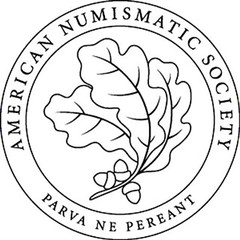 As part of Künker's eLive Auction 87, taking place from May 19-23, 2025, one-hundred coins from the Robert Ronus Collection, which were generously donated to the ANS, will be auctioned off to benefit the Society. ANS Trustee Robert Ronus is a passionate coin collector, a dedicated numismatist, and a long-time supporter of the ANS. The portion of the Ronus Collection up for auction includes some very rare early modern coins from Europe, with a focus on Germany. All pieces are in exquisite condition.
As part of Künker's eLive Auction 87, taking place from May 19-23, 2025, one-hundred coins from the Robert Ronus Collection, which were generously donated to the ANS, will be auctioned off to benefit the Society. ANS Trustee Robert Ronus is a passionate coin collector, a dedicated numismatist, and a long-time supporter of the ANS. The portion of the Ronus Collection up for auction includes some very rare early modern coins from Europe, with a focus on Germany. All pieces are in exquisite condition.
NOMOS TO SELL COLLIER COLLECTION FOR ANS
The collection of Prof. James M. Collier is being sold by Nomos AG to benefit the Collier Prize in Ancient Numismatics offered by the American Numismatic Society. -Editor
The American Numismatic Society is pleased to announce that the Collection of James M. Collier is currently at auction by Nomos AG in Nomos 35 and Obolos 37. For Nomos 35, pre-bidding Part I will close on June 15, 2025 at 09:00 CEST (3:00 AM ET), and pre-bidding Part II will close on June 16, 2025 at 09:00 CEST (3:00 AM ET). For Obolos 37, Part I will close on May 17, 2025 at 16:00 CEST (10:00 AM ET), and Part II will close on May 18, 2025 at 16:00 CEST (10:00 AM ET). All proceeds from the collection will establish an endowment at the ANS to offer the Collier Prize in Ancient Numismatics in perpetuity.
The Collier Prize was established in 2020 with the generous support of ANS Trustee Carole Anne Menzi Collier in honor of her late husband Professor James M. Collier. It is the most substantial financial award supporting scholarship in ancient numismatics. The auctions will include many fine examples of ancient Greek, Roman, and Byzantine coins from the Collier collection. The auctions are now live at nomosag.com/auction.
VULCAN ON ANCIENT COINS
Mike Markowitz published a new CoinWeek article about Vulcan on ancient coins. Here's an excerpt - see the complete article online. -Editor
TO THE ANCIENT Greeks, he was Hephaistos. To the Romans, he was Vulcan. To the Etruscans, he was Sethlans. Many ancient cultures imagined a god of fire who presided over volcanoes and was a metalsmith who crafted magical armor and weapons. Of the 12 "Olympian" gods of the Greco-Roman pantheon, he appears on the fewest coins — a special challenge for collectors eager to assemble a "complete" type set of deities.
The eminent Belgian numismatist François de Callataÿ tabulated the frequency of Greek gods and heroes on coins in a major collection (de Callataÿ, 118). Zeus topped the list with 14,019 appearances, Athena with 7,503, and Apollo with 3,634. Poor Hephaestus appeared on 20.
SEDE VACANTE COINS
While the world waited for white smoke from the Sistine Chapel, the Catholic Church was without a Pope. In a little-known practice, coins have been issued to commemorate the (usually, but not always) short period in-between Popes - Sede Vacante coinages, or "Vacant Seat". Thanks to Nick Graver for suggesting the topic, although I wasn't able to pull this together for last week's issue while we were still in the latest interregnum period. Numismatic News had a nice article by Mark Benvenuto about this. Here's an excerpt - see the complete article online. -Editor
HOBO NICKEL FLAPPER CARVINGS
The Spring 20205 issue of Bo Tales from the Original Hobo Nickel Society has a nice article by Barry Homrighaus on "Flapper Carvings" - nickels sculpted to depict the fashionable young women "flappers" of the early 20th century. With permission we're publishing an excerpt below. Thank you! See the complete issue for more. -Editor
Most classic hobo nickels depict bearded gents in derby hats. Classic carvers also portrayed and often satirized lots of other male characters; Irishmen, Chinamen, Rabbis, Shriners, Uncle Sam, Honest Abe, etc. But ladies on hobo nickels are exceedingly rare.
Only thirty-eight images of women can be found among the more than 2,800 classic carvings (i.e. carvings on Buffalo nickels made before 1982) in the OHNS archives. Three of these thirty-eight are women with artfully-styled long hair, carved by "Bert" Wiegand. Twenty-six more are attributed to "Bo" Hughes, mostly images of his lover "Monique." Of the remaining nine portraits of women in the archives, eight are Flappers, and it was these eight which initially caught my interest. Subsequent research located four more Flappers in private collections which having never been the subject of a QD examination cannot be found in the archives.
WAR MUSEUM EXTENDS VICTORIA CROSS EXHIBIT
Britain's Imperial War Museum has extended through the end of September their impressive exhibit of Victoria Cross and George Cross medals lent by Lord Ashcroft. -Editor
Imperial War Museums bosses have performed a partial U-turn on their controversial decision to close the Lord Ashcroft Gallery at the end of the month
Thousands more people can see the world's largest collection of Victoria Cross and George Cross medals in a victory for Britain's "bravest of the brave". War heroes took a stand outside the Imperial War Museum in London last week in protest over the venue's plans to remove their gallantry gongs from public display at the end of this month to make way for exhibitions about post-World War II conflicts.
MOTHER'S DAY NUMISMATICS
E-Sylum readers love history, and I thought I'd first share this interesting background on Mother's Day from Garrison Keillor's Writer's Almanac. -Editor
It's the second Sunday in May, which is Mother's Day here in the United States. It's Mother's Day in other countries, too, including Denmark, Italy, Venezuela, Turkey, Australia, and Japan.
A woman named Anna Jarvis was the person behind the official establishment of Mother's Day. Her mother, Anna Reeves Jarvis, had a similar idea, and in 1905 the daughter swore at her mother's grave to dedicate her life to the project. She campaigned tirelessly for the holiday. In 1907, she passed out 500 white carnations at her mother's church, St. Andrew's Methodist Episcopal Church in Grafton, West Virginia — one for each mother in the congregation. In 1912, West Virginia became the first state to adopt an official Mother's Day, and in 1914 President Woodrow Wilson made it a national holiday.
Anna Jarvis became increasingly concerned over the commercialization of Mother's Day. She said, "I wanted it to be a day of sentiment, not profit." She was against the selling of flowers, and she called greeting cards "a poor excuse for the letter you are too lazy to write." Nevertheless, Mother's Day has become one of the best days of the year for florists. When Anna Jarvis lived the last years of her life in nursing home without a penny to her name, her bills were paid, unbeknownst to her, by the Florist's Exchange.
UNEXCHANGED SWISS BANKNOTE FUNDS
Kavan Ratnatunga passed along this article about unexchanged obsolete Swiss banknotes. Thanks. -Editor
Switzerland's central bank said today (May 9) that it would hand over to the government an emergency relief fund cash that had previously been earmarked for the exchange of old banknotes.
The Swiss National Bank (SNB) is to transfer a total of Sfr890.6 million ($1.07 billion) that was set aside for the exchange of sixth-series banknotes, which ceased to be legal tender in 2000. The bank said the Sfr890.6 million amounted to 90% of the value of the notes that had not been exchanged by April 30.
LOOSE CHANGE: MAY 11, 2025
Here are some additional items in the media this week that may be of interest. -Editor
Michael Garofalo published a nice Greysheet article on sculptor Adolph Weinman. Here's an excerpt - see the complete article online. -Editor
Although he was a member of the American Numismatic Society, Weinman did not actually consider himself to be a coin designer or medalist. Weinman often referred to himself as a sculptural artist.
In fact, the Mercury Dime and the Walking Liberty Half Dollar are Weinman's only successful coin designs. However, his son, Howard Weinman, did design an American coin that was struck by the United States Mint. He designed the 1936 Long Island Tercentenary Commemorative Half Dollar. That, too, was Howard's only successful coin design.
ABOUT THIS ISSUE: MAY 11, 2025
Not much worth mentioning this week that didn't already go into this issue. I was at the movies again this week - my boys and I went to see the 50th anniversary showing of "Monty Python and the Holy Grail". We enjoyed it, and it held up well. I guess supreme silliness never goes out of season.
I couldn't find a numismatic connection anywhere, but I suppose for bibliophiles there's the Book of Armaments (and the Holy Hand Grenade of Antioch). -Editor

